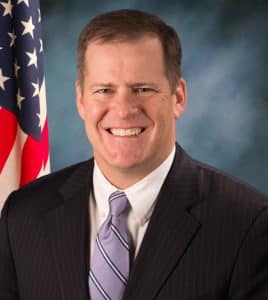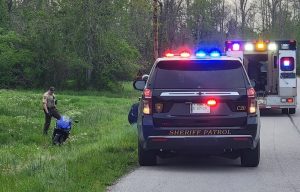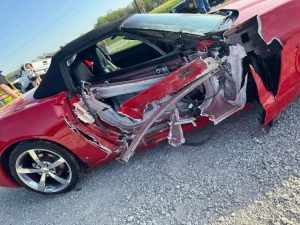Bigger plans for Schimpf?

State Sen. Paul Schimpf (R-Waterloo) confirmed on his official campaign social media pages Monday night that he is considering a run for Illinois governor.
That news has been rumored in local political circles for some time, and a Chicago radio station listed Schimpf among several possible Republican challengers to Democrat Gov. JB Pritzker in 2022.
“That is accurate,” Schimpf said of the report. “But until my senate term is finished, which is going to be here in a week, I’m not going to be doing any interviews discussing my future political plans. I’m still a state senator.”
Schimpf also spoke with the Republic-Times about his one term in the senate, which is set to end Jan. 12 after a lame-duck session of the Illinois General Assembly.
“It was certainly an honor and privilege, and I enjoyed doing it,” Schimpf said of representing a district that stretches from St. Clair to Union counties. “One of the things I enjoyed about representing the 58th legislative district is it is a very diverse district… Some of the values and beliefs that we have in Monroe County are different from how people feel down in Carbondale and Jackson County, where you have a very progressive community.”
Schimpf was elected in 2016 to replace retiring GOP state Sen. Dave Luechtefeld in Springfield.
When campaigning, the U.S. Marine Corps veteran said his top priority would be getting the state’s “fiscal house in order.”
Schimpf said that did not happen in his four years in the Legislature.
“We are in worse shape now than what we were back when I was running for the senate,” he argued, citing increased spending and higher taxes. “I’m proud of my voting record. The votes that I cast would have tried to solve the problems that we face, but, unfortunately, I was on the losing end of a lot of those votes.”
Looking back at his time in the senate, Schimpf said he was surprised by the amount of legislation filed in the state each year and the research required to understand each bill.
In contrast to his time as one of eight staffers for a member of U.S. Congress responsible for analyzing legislation and making voting recommendations, Schimpf only had one aide who mainly handled administrative work.
“It takes time to look at legislation and figuring out how I’m going to vote,” Schimpf said. “For the most part, I’m on my own.”
Legislatively, Schimpf said he was most proud of the bipartisan working group focused on higher education in 2018.
“We were able to pass 10 legislative items that were designed to help our higher education students in Illinois recruit and retain our best high school students,” Schimpf explained. “It was successful because nobody cared who got the credit. It was just people working together.”
He also said he was proud of his work to promote the idea that southern Illinois and Southern Illinois University Carbondale have a symbiotic relationship and raise the profile of the Southwest Illinois Highway Connector.
Throughout his work in office, Schimpf said his biggest takeaway was what a senator can and cannot do.
He said a senator can introduce, speak for or against and cast a vote on legislation, but a senator cannot do other things like force the governor or state agencies to act in certain ways.
“I can certainly advocate on behalf of my constituents, but a lot of times people were expecting me to be able to force legislation to come up for a vote, and I didn’t have the ability to do that,” Schimpf noted.
While he declined to discuss his political future, Schimpf said he has “no regrets” about not seeking a second term in the senate.
“The reason I didn’t run for re-election was at the time I would have had to file for re-election I was being considered for one of the federal judge vacancies,” he said. “I think you have no business running for one office if you have your sights set on something else.”
Regardless of his role in it, Schimpf said the most pressing problem facing politics in America is the toxicity that pervades it.
He cited his campaign against Democrat Sheila Simon in 2016 as an example of how political discourse should work, saying the two vehemently disagreed but remained respectful.
Schimpf said he still considers Simon a friend.
“We need to be able to have policy disagreements without turning that into hatred,” he stressed. “The magnitude of the problems we face are such that we cannot solve them if we’re completely divided. We have to be able to work together.
“You cannot understand a problem if you are looking at it from just one perspective,” Schimpf continued. “We need each other and our differences of opinion. I hope our country will be able to get back to a place where we can listen and respect each other without immediately launching into an attack.”








